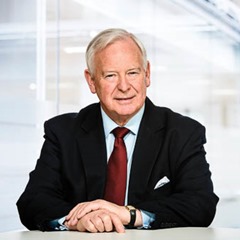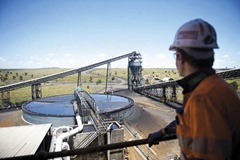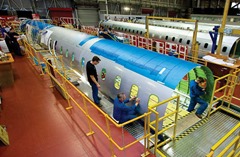Engineering for growth
 A career in engineering has led Sir John Parker to the chair of Anglo American, the world’s largest diamond and platinum producer. He talks to Peter Cheney about the discipline’s economic importance and his ambitions for Northern Ireland.
A career in engineering has led Sir John Parker to the chair of Anglo American, the world’s largest diamond and platinum producer. He talks to Peter Cheney about the discipline’s economic importance and his ambitions for Northern Ireland.
Once one of Northern Ireland’s most prominent business leaders, Sir John Parker now chairs the world’s largest diamond and platinum producer but is still passionate about how his discipline – engineering – can transform a country’s economic prospects.
Parker has chaired Anglo American plc since August 2009 and is the current President of the Royal Academy of Engineering (RAE). He is Vice-Chairman of port developer DP World and a non-executive Director of Airbus and Carnival, the world’s largest cruise ship operator. He is best known in Northern Ireland for leading Harland & Wolff between 1983 and 1993, overseeing its privatisation.
While his career has taken him to top of the corporate world, Parker has modest roots. Born into a County Down farming family, he attended Newcastle Technical High School and then joined Harland & Wolff as an apprentice. Courses in naval architecture and mechanical engineering followed at Belfast College of Technology and Queen’s. His first job after graduation was on the ship design team at Harland & Wolff in 1964.
Returning to Queen’s for the Sir Bernard Crossland lecture, his theme is ‘engineering for growth’ and he is “very honoured” to commemorate his mentor.
Crossland joined the university in 1959 and had a long career in research and public service until he passed away in 2011.
Speaking to agendaNi beforehand, Parker remarks that engineering “translates good science into products that can be manufactured and sold, and indeed engineering services.”
Britain also needs to work how to reduce its export deficit and rebalance its economy. North Sea oil and gas is in decline and growth in financial services is slower than before the crisis. The only way forward, in his view, is to “drive for engineering and technology and good science to create the future.”
Parker adds: “We’ve got to increasingly live off our intellectual horsepower. I think the innovation that’s going on in our universities is crucially important.” The RAE has established an ‘enterprise hub’ whereby up to 80 entrepreneurs offer to help young researchers to commercialise their research e.g. advice on business planning and sources of finance.
Each year, the RAE, the Royal Society and Royal Society of Medicine put a collective case to government for pure and applied research. Continuing this funding is “very, very critical.”
He is also pleased to see the Government adopting a modern industrial strategy for key growth sectors. Industry is working with government on a 20-year vision on making the UK more competitive in each sector, the R&D and educational needs to support that vision, and what government can do to “oil the wheels” to advance it.
“In a company strategy, you’re joining up the departments. You’re linking them with common objectives,” Parker comments. “And it should be the same in government, to get alignment across government departments [so] that we are creating the right atmosphere for industrial corporations and SMEs to flourish.”
Asked for the main lessons learned over his time in business, Parker says that he has had the “good fortune” to serve in several different industries. As a Chairman, the critical importance of establishing “a board that’s fit for purpose” stands out. Finding “the best quality people you can to do the job” has also served him well as a Chief Executive.
“You should weed out under-performers and you should concentrate on building a quality executive,” he continues. “And in my case now as a Chairman, you try to build a quality board that has got a great spread of skillsets and has the experience to deal with almost any issue that might walk through the boardroom doors.”
Parker also emphasises the importance of “constantly sensing out” the market in which the company operates “and how they might develop and how you must adjust your business.” Keeping the organisation competitive in a global marketplace matters “above all” and this again reaffirms the need to recruit the best engineers, scientists and project managers.
The conversation turns to Anglo American and he describes its CEO, Mark Cutifani, as “one of the most experienced senior miners in the world.” An Australian, Cutifani has worked in mining for 35 years. Over the next three years, Anglo American is aiming to lift its return on capital from 10 per cent to 15 per cent.
Anglo American’s portfolio is much wider than diamonds and platinum, producing iron ore, coal, copper, nickel, phosphates and manganese.
“It’s very tough in South Africa just now because we have big strikes,” he says, referring to its platinum business. “But that will pass and we’ll ultimately concentrate there on the right platinum mines for the future.”
The company has settled wage claims with the National Union of Mineworkers – which represents most miners – but not with the breakaway Association of Mineworkers and Construction Union. A confrontation between the latter union and police resulted in around 44 deaths at the Marikana mine in 2012. A commission of inquiry into the case is currently under way.
Environmental factors are “a huge part of our licence to operate” in all countries where the company operates.
“We’re very consistent,” Parker states. “We will not apply different standards in Peru or in Chile compared to South Africa or Australia.” The design process for an Anglo American mine also includes a closure plan which looks at how to manage the whole environment and local communities. In many cases, new mining operations result in new villages or townships being created.
He continues: “The social management of mining and the environmental management of mining has to be absolutely top of the agenda, and you can’t take short cuts. You have to do it in the most responsible way you can.”
Environmental engineers, zoologists and botanists are brought together when a mine is being designed so that is not just designed from a purely engineering point of view.
As we discuss his ambitions for Northern Ireland, he recalls running Harland & Wolff “in the eighties when the bombs were going off, a very challenging time.” He would visit Hong Kong to try to sell ships and watch the news from Belfast in his hotel room.
“So when you went to the ship owner’s office next morning hoping to sell a ship, all you got was half an hour of conversation about how bad the Troubles were and ‘Would it be even safe for them to send people?’”
 Peace and stability is naturally “the first thing I would wish for Northern Ireland.” Secondly, all political parties, regardless of their creed, should “concentrate and unite around increasing economic activity in the private sector.”
Peace and stability is naturally “the first thing I would wish for Northern Ireland.” Secondly, all political parties, regardless of their creed, should “concentrate and unite around increasing economic activity in the private sector.”
A real effort to incentivise the switch from the public to private sector needs to happen. Creating jobs and therefore a future for young people should be a “totally cross-party” priority. Parker wants to see continued support for its two world class universities, especially to “nurture the potential to commercialise on ideas”.
All of this points back to the critical need to leverage good science and good education. “We need all hands on deck in Ireland as a whole and in the UK as a whole to drive through industrial strategies that are relevant to the markets that we’re working in,” he says in conclusion. “That way, I think we can create real economic health.”
Headquartered in London, Anglo has 100,000 employees. Its mines are located in southern Africa, South America, Canada and Australia and its operating profit in 2013 was $6.6 billion. Anglo produces 40 per cent each of the world’s platinum and rough diamond supplies, and owns 85 per cent of the diamond company De Beers.
Anglo American’s name comes from the support from British and American financiers, given to its founder Sir Ernest Oppenheimer in 1917. It merged with Luxembourg-based mining firm Minorco to form Anglo American plc in 1999.
UK industrial strategy sectors
• Aerospace
• Agricultural technology
• Automotive
• Construction
• Information economy
• International education
• Life sciences
• Nuclear
• Offshore wind
• Oil & gas
• Professional & business services






